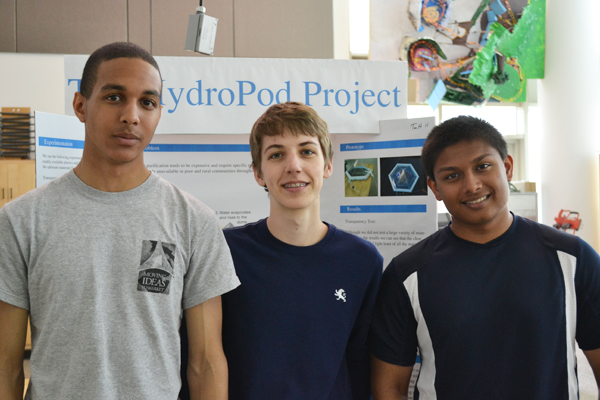
By Tara Cavanaugh
It’s a simple design: a hexagon base with plexiglass rising to form a point in the middle. It would take ten minutes to assemble, and around $25 to buy. And it could greatly improve access to clean water in developing countries.
That’s because the invention, called the HydroPod, would be the cheapest and simplest device available to produce clean drinking water. It was the idea of three Skyline seniors, Andrew Burns, Densu Dixon and Swagat Tripathy, who are finishing their capstone course in the Design, Technology and Environmental Planning magnet this spring.
Most recently, the students took third place in the national Siemens “We Can Change the World” Challenge. They won a $10,000 college scholarship to share and they each took home a tablet.
The trio also took first place in the statewide Young Inventors Competition in February, winning $1,000 cash prize and a year of legal and product support from the Prima Civitas Foundation.
The students describe the HydroPod as a solar water distiller that uses heat and UV light from the sun. Made of recycled plastic, it evaporates water while collecting all the condensed remnants and eliminating all bacteria and viruses. It’s designed to sit on top of a body of water, and it could produce 1.4 liters of water a day.
Not only is the HydroPod much cheaper than other similar devices, the invention produces a larger amount of water and would also be cheap to ship: the device folds up and even provides padding for itself, making for easy packaging. The students say that a family would need one or two HydroPods in order to have enough clean drinking water each day.
They are finishing their second prototype this month, and for reasons they want to keep secret for now, the second HydroPod might be even cheaper to produce and purchase.
So what’s next for the HydroPod? The students aren’t sure yet. If they could get the proper funding to continue, they’d be interested in mass producing it. But one thing is for sure: they don’t want the idea being exploited.
Other devices are more expensive because of marketing and shipping costs, explained Swagat. “But with this we know that if we work from home and we ship it by ourselves, we can ship it at a realistic price.”
No matter the future of the HydoPod, Swagat, Densu and Andrew hope to stick together next year, because they have another goal in mind: forming a company to help young inventors just like themselves. They’re thankful for the help they received from their teacher Tom Pachera and student teacher Frank Norton, and they want to pay it forward.
Pachera is particularly impressed with Swagat, Densu and Andrew and the effort they put into the project outside of the classroom. The three traveled with Norton to Holland, Mich. to visit Aqua Clara, a nonprofit that works to provide people in developing countries with access to clean water.
“All of my students who have gone beyond the classroom are excelling,” Pachera said. “It’s all about getting that real world experience.”
More on the AAPS News

Amazing. I really appreciate the hard work you boys put in. Kudos